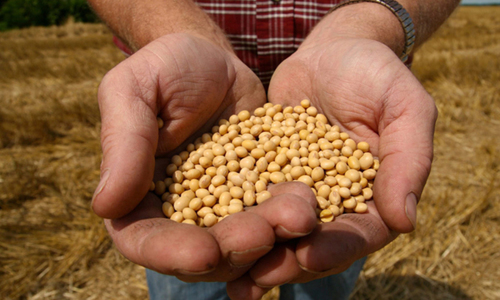US to help Pakistan introduce genetically-engineered corn

ISLAMABAD: The Foreign Agricultural Service of the United States Department of Agriculture (USDA) has said that future collaborative projects between the US and Pakistan include using American soybean feed in poultry, fish farming and dairy industries, introducing genetically-engineered maize and working with various government departments to develop uniform food safety standards.
“Soybean from the United States will serve as raw material for poultry, fish farming and dairy industries in Pakistan. We are working collaboratively with the government and the industry not only in poultry but also in the new and exciting area of fish farming which is in the pipeline,” Casey E. Bean, USDA official based in US Embassy in Islamabad, told Dawn.
“Approval of genetically-engineered maize is currently being considered in Pakistan. It would offer farmers a tool to increase their production and reduce use of agricultural chemicals,” he claimed.
Talking about the complicated relationship between the two countries, Mr Bean told Dawn, “While political highs and lows in the relations between the two countries occurs, US-Pakistan cooperation in the agricultural sector has always been an important part in our bilateral relationship of seventy years.
“The deep relationship between the agricultural scientists of the two countries is evident in the collaboration on developing seeds for wheat, rice, sugarcane and cotton. Agriculture sector is an incredibly important sector in Pakistan and is a priority for the US. For these reasons the USDA mission has an office in Islamabad,” he said.
Allies in fighting terrorism, Pakistan and the US have a knotty relationship, especially over Afghanistan. In the past the Washington has accused Islamabad of playing a double game but in February this year US President Donald Trump said that the United States had developed a “much better relationship” with Pakistan.
Uniform food safety standards and food security are two other areas where the USDA is working with local government departments, Mr Bean said. USDA is working with the Department of Commerce, the Ministry of National Food Security and agribusiness sector to implement food safety standards such as food labels illustrating ingredients contained in food products.
The federal government’s food security authority would be able to provide oversight to provinces to adhere to international standards consistently ultimately benefiting consumers, Mr Bean said.
USDA will assist the ministry of national food security and research for the national food system project, as after devolution, it has become important for Pakistan to have a central food security authority. In this area, USDA is working with Pakistan Agriculture Research Council scientists for reducing aflatoxin (toxic fungus) in food crops.
USDA and USAID launched a programme sometime last year to introduce aflatoxin control in Pakistan currently at field trial stage. Aflatoxin is produced by molds, and it often grows on food crops such as corn, peanuts, chillies, ground nuts but even cotton seeds are susceptible. US scientists were working with a private sector maize company in Pakistan to develop a technology to combat aflatoxin, said the US official.
About cotton, he said this sector is tremendous win-win situation for Pakistan. Textile is a large export earner for Pakistan in which cotton as raw material imported from the US has a significant share in Pakistan’s textiles.
Published in Dawn, May 20th, 2019















































